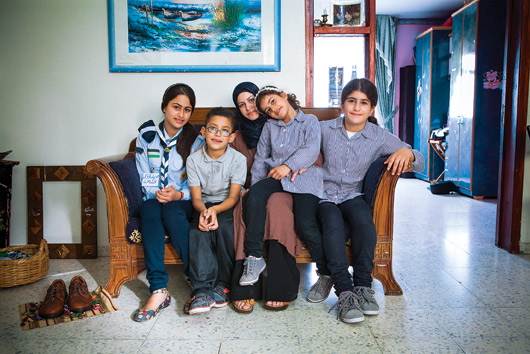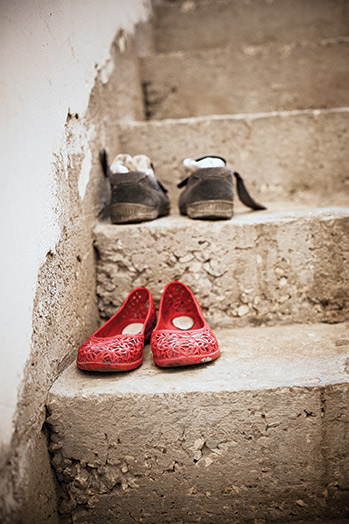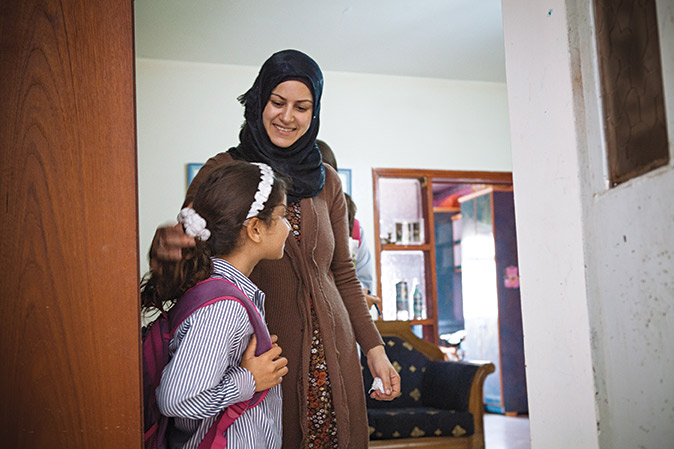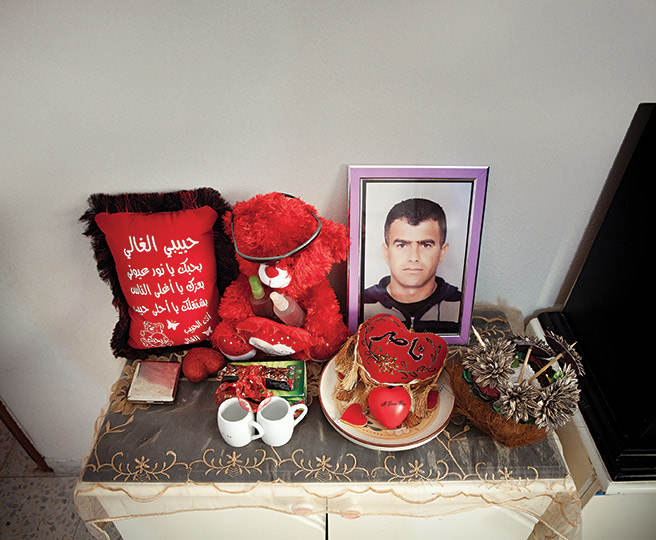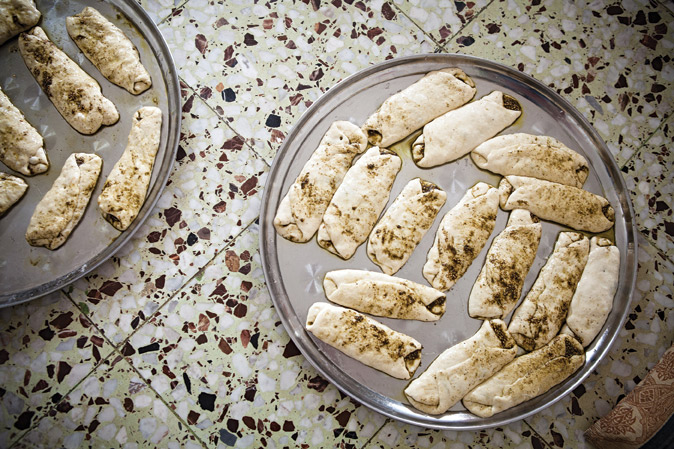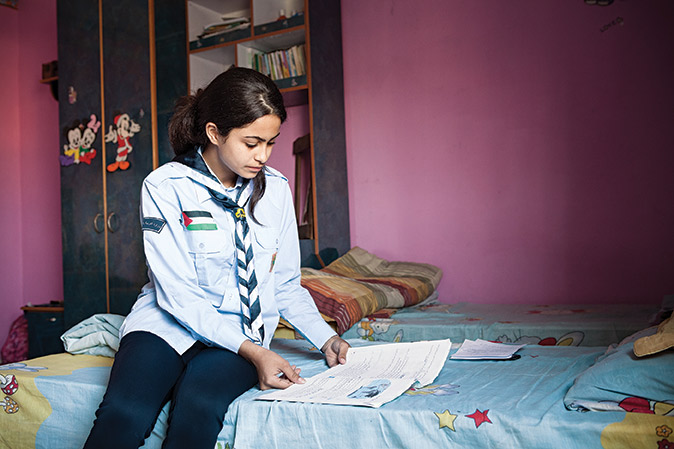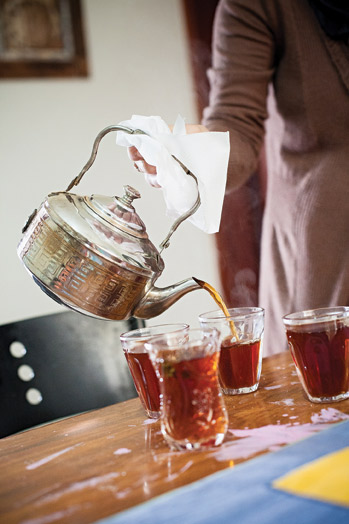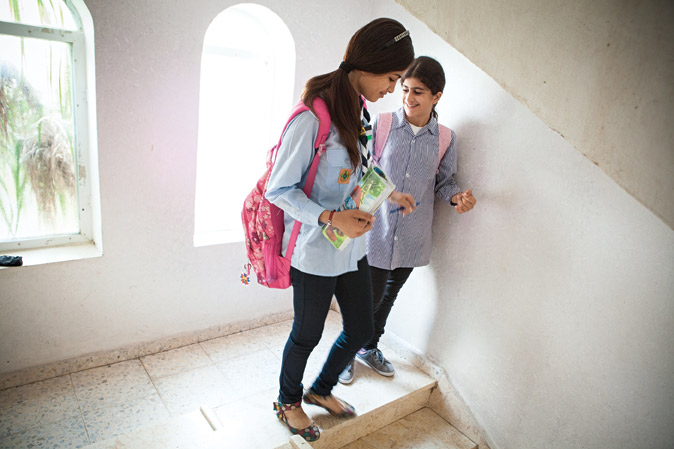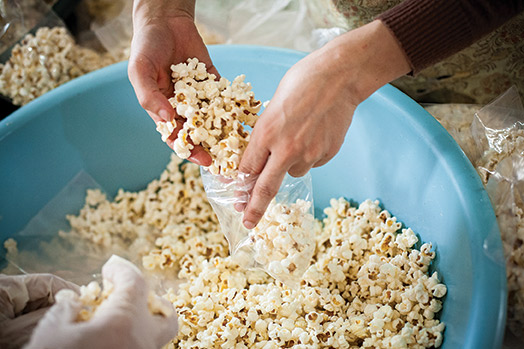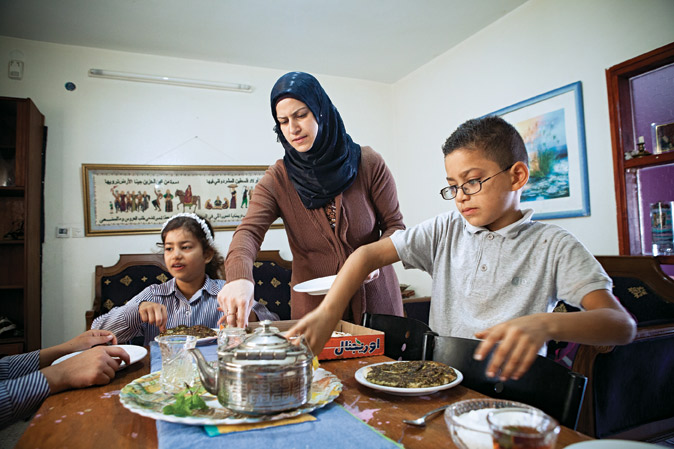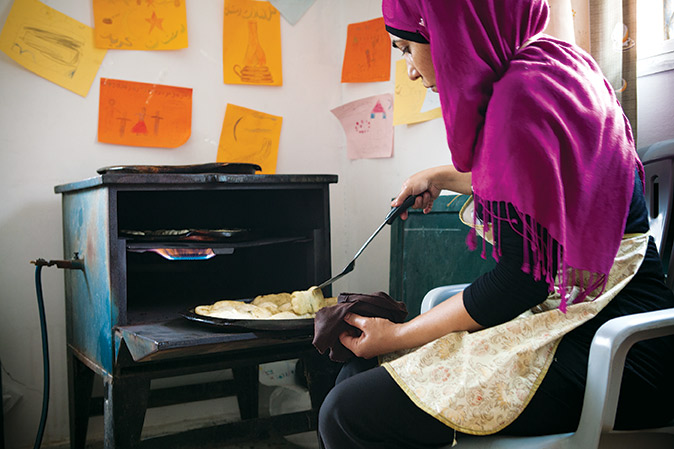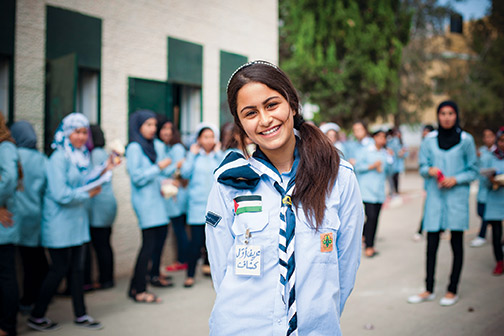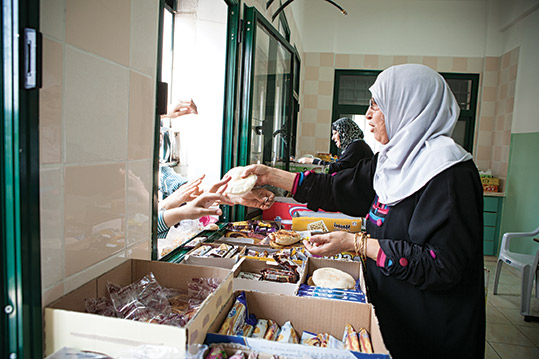The Breadwinner
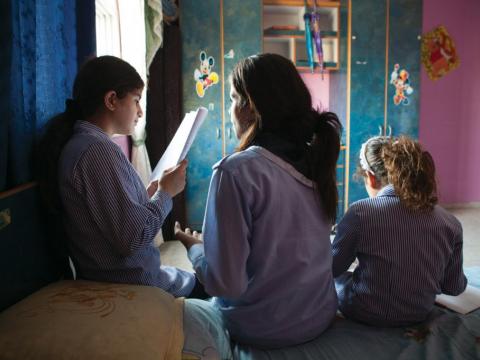
1.
I’m not going to school today. I don’t want to go!” declares Saleem, whizzing around the living room wearing his uniform. The nine-year-old’s three sisters don’t hear him.
They’re in their bedroom studying before class. Outside their window, a postcard view of the homes and hills of their city, Jenin. Farther in the distance is Nazareth. To the west, Israeli settlements.
The smell of baking bread topped with goat cheese, thyme, sesame seeds and olive oil invades the room like the aroma of a pizza parlor, but it comes from the family’s kitchen. There, Manal, the children’s mom, bakes. She’s boiled water for tea and calls her kids to the table. They can’t be late for school and she can’t be late for work.
Fifteen-year-old Madlen, 12-year-old Maya, and eight-year-old Sara take their seats. The sisters grab their food. Saleem takes his and races to the roof, his preferred breakfast-eating space. They eat quietly. After their final bites and last sips, the children take their dishes to the kitchen. Getting Manal’s foursome to eat breakfast isn’t usually this easy.
The kids brush their teeth and assemble in the living room with their backpacks. On a credenza by the china cabinet, a photo stands behind teacups, a cigarette tin, a satchel of coffee and a bottle of cologne—mementos of Manal’s husband and the children’s father, Naser. His name is embroidered in Arabic on a heart-shaped pillow.
At the door, the kids say goodbye to Mom, kiss her and head off to school. Even Saleem.
2.
Manal finishes tidying the kitchen and prepares to leave. She’ll have breakfast during her morning break at work. She gets her coat and purse. In the foyer outside the door is a pair of Naser’s runners and two candles. Manal locks up and hides the front-door key for her kids. They’ll come home before she does.
Manal walks. It’s a quiet 10 minutes, giving her time to reflect. She often thinks, “Am I late?” She’s not.
Along with having her children’s sponsorship through World Vision, the organization also has a presence in their schools, which is how Manal found herself at the women’s centre learning how food processing would help her family. The training program addresses unemployment and poverty—common hardships in a land beset by political problems. In 2002, the Israeli government began building a separation barrier between the West Bank and Israel. Both the Canadian government and the International Court of Justice consider the barrier illegal. It cuts off Manal’s family from jobs, clinics and schools in Israel. When Manal started work in September last year, she and her children felt relief. “The kids were happier than me.”
Manal arrives at a grey building, the sharp, salivating smell of baking escaping its doors and windows. The women are preparing snacks—pastries, popcorn and turmus beans, which look like un-popped popcorn and taste similar. Manal greets her sister-in-law, Diana, who also works at the centre. Manal is a small woman, with an unlined face and greyish-blue eyes. She doesn’t look her 33 years. With her apron on, she is ready to work.
While Manal was making breakfast for her kids, her co-workers were making the dough here. Manal will use it to prepare pastries that’ll bake in the two ovens that feel as though they heat the entire building.
She splashes oil on the table, grabs a ball of dough and rolls it out. She adds a familiar filling: thyme, sesame seeds and cheese. The difference between her children’s breakfast and the pastry here is an extra step: Manal folds the dough to make a turnover, one of the 700 that she and her co-workers will bake today. They’ll sell each one for a quarter shekelduring recess at five schools.
Manal saves the money she earns at the women’s centre for her children’s future. “It’s true,” she says, “400 shekels isn’t much, but it helps.” Her salary equals a bit more than C$100 a month. “It’s the most important thing to meet your children’s needs.”
From another agency, Manal receives 180 shekels (C$46) that she spends on groceries and a daily two-shekel (C$0.50) allowance for her children. “I’m trying to be careful and save my money,” she says. “I can’t be the way I was before. I look for things that are cheaper.”
Not long ago, Manal’s family could afford to travel and she didn’t worry about the price of a dress. Her 39-year-old husband worked as a mover, earning a salary that satisfied the family’s needs. Then in 2010, Naser was working on an elevator that fell.
“I was at home,” says Manal, tears filling the corners of her eyes. “My brother called and said there was an accident. We didn’t know what kind. They said he was still living. When we arrived at the emergency room, we found out he wasn’t alive.”
Naser and Manal married in 1995. She was an honour student, but dropped out in Grade 12 when she became pregnant with her first child. Manal stayed at home, caring for their kids. She thought when they grew up she would find a job at a kindergarten.
But when Naser died, Manal had to become the family’s breadwinner. She wasn’t prepared. “I thought I was a strong person, but with everything that happened, that changed,” says Manal. “In the beginning, everyone is supportive, but then, slowly everyone goes back to their own life. And you’re back on your own.” She spent hours each day crying in her room. But “Life didn’t stop,” she says. “I thought of my children’s future and their education.”
So she changed her approach to life. “I don’t want to depend on someone else. If that person were taken away, then I’d have to start all over again. I want to be independent.”
Her personality has also changed. “People see how I’ve become stronger. My children see that.” Working has helped. “When I come to the centre, I feel like I release my negative energy. It relaxes me. It gives me solace.”
Manal’s sister-in-law has seen the change, too. “It’s amazing. We are proud of her,” says Diana. “She can do even more. She has so many capabilities.”
Manal plans to continue working at the women’s centre and would also like to take advantage of the computer training she received through World Vision. Finished baking, the women clean up as the snacks are shuttled to the schools.
3.
At Madlen’s all-girls school, it’s 10 o’clock—the start of morning recess. Breakfast is a distant memory. Class has given the kids an appetite. A giant crowd huddles at the snack bar, waiting to make it to the front of the line, shekels in hand.
Behind the serving window, it’s calmer, quieter—the difference between listening to loud music with one ear bud versus two. The interior is a convenience store checkout: a kaleidoscope of snacks, something for all tastes. A student hands over her shekel and walks away with a pastry baked at the women’s centre. They’re nearly sold out.
Madlen rates the pastries as “really yummy.” Biased opinion? “No!” she protests. “They’re really good.”
Madlen’s polka dot shoes, navy uniform, silver hairband and red watch don’t match, but put together, they complement each other, showing her sense of style. “Sometimes when I’m in class, I remember my mom and I always try to be good and calm,” she says. “I try to be at the top of my class, so my mom can be happy and proud.”
When her dad passed away, “Mom used to sit and cry and cry,” says Madlen. “We didn’t know what to do to cheer her up. We used to fight more. Once I spilled a cup of orange juice just so she would come out of her room to clean it up.”
Madlen’s mom is proud—her eldest daughter is at the top of her class in economics and math. She’s also won awards for her writing. “I write about Jerusalem, about freedom and the pressure we live under.”
Since her mom started her new job, Madlen has seen a one-shekel increase in her allowance. Now she can buy more school and art supplies. And, of course, clothes. Madlen is a teen, after all.
She’s a saver, too. Once she spent a year saving to buy a camera. “I love it. I really love photography. I take my camera everywhere.” She prints her photos, which are often colourful and scenic, to show her friends and she also posts them on Facebook.
As recess ends, Madlen points to her house from the schoolyard. It’s a 10-minute walk she’ll make later when the bell rings for everyone to go home.
4.
Manal prepares dinner for her kids. They’re hanging out in the guestroom where their parents used to sleep and where the TV is. After Naser passed away, Manal started sleeping on a mattress in her children’s bedroom. Out of their school uniforms, the kids wear comfortable clothes. Sara snacks on turmus beans unafraid she’ll spoil her appetite.
A South Korean soap opera plays on the TV as Madlen sits on the bed and talks about her mom. “Now things are calmer,” says Madlen. “She goes to work, and she’s with people there and then we come home. Now she doesn’t sit alone. Things are tidy. We finish our homework more quickly so we can watch TV together.”
Madlen’s necklace reads “Mama” and her feelings about her are succinct: “I love her very much.”
That love also means helping out around the house. But Maya sees it differently. “She always watches TV,” says Maya.
“That’s not true!” Madlen protests, explaining how she tidies her room and her cupboard.
“She cleans her cupboard,” says Maya. “She doesn’t clean my cupboard.”
When they fight, Maya will try to make peace by offering her older sister some costume jewellery. But Madlen will look at the gift and act disappointed. She tells Maya that she does this to teach her that a person can’t be impressed about everything.
Talk turns to money. Sara says she’d like to save her allowance, but it’s not so simple. “I try to save. But they steal it from me.”
“Really? Who steals from you?” Maya asks skeptically.
“One day, I saved my pocket money and I came back and it was gone. Someone opened my bank tin for me.” Sara goes to her bedroom and brings back her Hello Kitty bank tin. She shows that it’s empty. The case remains a mystery.
Just before dinner, the kids go up to the rooftop to play with a camera and to work up an appetite. The sun starts to set. And soon, Manal is calling them back inside. They journey down the stairs to the kitchen and their mom serves plates of rice and vegetables that are colourful and comforting. Manal, Madlen, Maya, Saleem and Sara eat, ending their day the way it began: together.
* * *
Help on the West Bank and the Gaza Strip
• World Vision supports 14 community clusters
• 116 communities benefit in total
• 48,450 children are registered for sponsorship
• More than 9,350 children are waiting for sponsors
• More than 530,000 people benefit from World Vision projects
• Overall unemployment rate is 17.1%
• Unemployment among women is 29.5%
• Poverty rate is 21.9%
• Food insecurity rate is 33%
The organization’s six project themes
• Protecting children
• Developing and fostering faith
• Creating gender equality
• Helping children and people with disabilities
• Improving the environment
• Building peace
About the Women’s Centre
• Project started in 2011
• Trained 30 women
• Rents 5 school snack bars
• Women work at both the women’s centre and at the schools
The Barrier
• Israel began to illegally build what is commonly known as “the wall” in 2002.
• In most areas, the barrier comprises an electronic fence with dirt paths, barbed-wire fences and trenches on both sides, at an average width of 60 metres. In other areas, a concrete wall was built six to eight metres high.
• Once complete, the separation barrier will be 708 km long—twice the length of the 1949 Green Line.
• Obtaining a permit to cross the separation barrier is extremely difficult and undefined for a Palestinian.
• The separation barrier cuts off families and community members who share cultural and economical ties in neighbourhoods on the east side of Jerusalem.
• Palestinian tax payers are unable to access better health, education and other services they are entitled to.
• West Bank and Gaza ID holders are not allowed entry to East Jerusalem without a valid permit.
• Construction of the separation barrier has also restricted access to water in the West Bank.
Make Manal’s pastries
Here’s the recipe for the pastries Manal makes. It’ll make 20–25 medium-sized pastries or 50 small ones.
Dough:
2½ tsp yeast
2 tsp sugar
1 cup lukewarm water
4 cups white flour
1 tbsp salt
1 cup corn oil (approximately)
Filling:
thyme, to taste
olive oil
goat cheese (or other cheese, as desired)
1. Dissolve yeast and sugar lukewarm water.
2. Mix remaining dough ingredients in a bowl (add more or less oil depending on how you like the consistency of the dough); cover. Leave dough to rise for two hours.
3.Roll dough into palm-sized balls. Let rest for 15 minutes.
4. Knead dough balls into flat ovals and fill with thyme, a little olive oil and goat cheese.
5. Place on a non-stick cooking sheet lightly coated with olive oil.
6. Bake for 10 to 20 minutes at 400°F (200°C) until pastries are golden.
7. Eat and enjoy!
Want to Learn More? Useful Links and Websites
Settlements
- “Under the Guise of Legality: Israel’s Declarations of State Land in the West Bank,” B’Tselem, http://www.btselem.org/sites/default/files2/201203_under_the_guise_of_legality_eng.pdf
- “The Humanitarian Impact of Israeli Settlements Policies,” OCHA, http://www.ochaopt.org/documents/ocha_opt_settlements_FactSheet_January_2012_english.pdf
- Settlement Watch, Peace Now, http://peacenow.org.il/eng/content/settlements
Separation Barrier
- “The Annexation Wall and Its Associated Regime,” Al-Haq, http://www.alhaq.org/publications/publications-index/item/the-annexation-wall-and-its-associated-regime
- Legal Consequences of the Construction of a Wall in the Occupied Palestinian Territory, International Court of Justice, http://www.icj-cij.org/docket/files/131/1677.pdf, July 2004
Access and Movement in the Occupied Palestinian Territory
- Office for the Coordination of Humanitarian Affairs (UNOCHA), http://www.ochaopt.org (also excellent resource for reference maps)
- Gisha, Legal Center for Freedom of Movement, http://www.gisha.org
Jerusalem
- Grassroots Jerusalem, http://www.grassrootsalquds.net
- The Jerusalem Trap: The Looming Threat Posed by Israel’s Annexationist Policies in Occupied East Jerusalem, Al-Haq, http://www.alhaq.org/publications/publications-index/item/the-jerusalem-trap
Palestinian Refugees and the Right of Return/Palestinian Population Registry
- Badil: Palestinian Resource Center for Residency and Refugee Rights, http://www.badil.org
- “Forget About Him, He’s Not Here: Israel’s Control of Palestinian residency in the West Bank and Gaza,” Human Rights Watch, http://www.hrw.org/reports/2012/02/05/forget-about-him-he-s-not-here-0Displacement/Home Demolitions/Evictions
- Israeli Committee Against House Demolitions (ICAHD), http://www.icahd.org
- Infographic on Displacement, Visualizing Palestine, http://www.aljazeera.com/indepth/interactive/2012/08/2012830754014332.html
Gaza and the Blockade
- Al-Mezan Center for Human Rights, http://www.mezan.org/en
- “Five Years of Blockade” (facts on the five-year blockade), OCHA, http://www.ochaopt.org/gazablockade
- The Emperor Has No Clothes: Palestinians and the End of the Peace Process, Crisis Group, http://www.crisisgroup.org/~/media/Files/Middle%20East%20North%20Africa/Israel%20Palestine/122-the-emperor-has-no-clothes-palestinians-and-the-end-of-the-peace-process.pdf
Palestinian Authority and Foreign Aid
- Palestinian Authority: Hold Police Accountable for Ramallah Beatings, Human Rights Watch, http://www.hrw.org/news/2012/08/27/palestinian-authority-hold-police-accountable-ramallah-beatings
- The Dalia Association, http://www.dalia.ps
- “Should Palestinians Boycott Foreign Aid?” Nora Lester Murad, The Guardian, http://www.guardian.co.uk/global-development/poverty-matters/2012/oct/18/should-palestinians-boycott-international-aid
Palestinian Culture
- Mahmoud Darwish, http://www.mahmouddarwish.com/english/introduction.htm
- For information on subjects including Palestinian literature, visual and performing arts and cuisine, please see the Institute for Middle East Understanding, http://imeu.net/news/life-and-culture.shtml
Visual Tools
- Interactive Maps: http://alhaq.mits.ps/index.php/interactive-map
- Virtual Field Visits: http://alhaq.mits.ps/index.php/virtual-field-visits
General News
- http://english.aljazeera.net
- http://www.maannews.net/eng/Default.aspx
See a fun photo gallery featuring photo's by Manal's daughter, 8-year-old Sara, and visit the extended photo gallery of Jenin!
See Manal's story on Child View!
